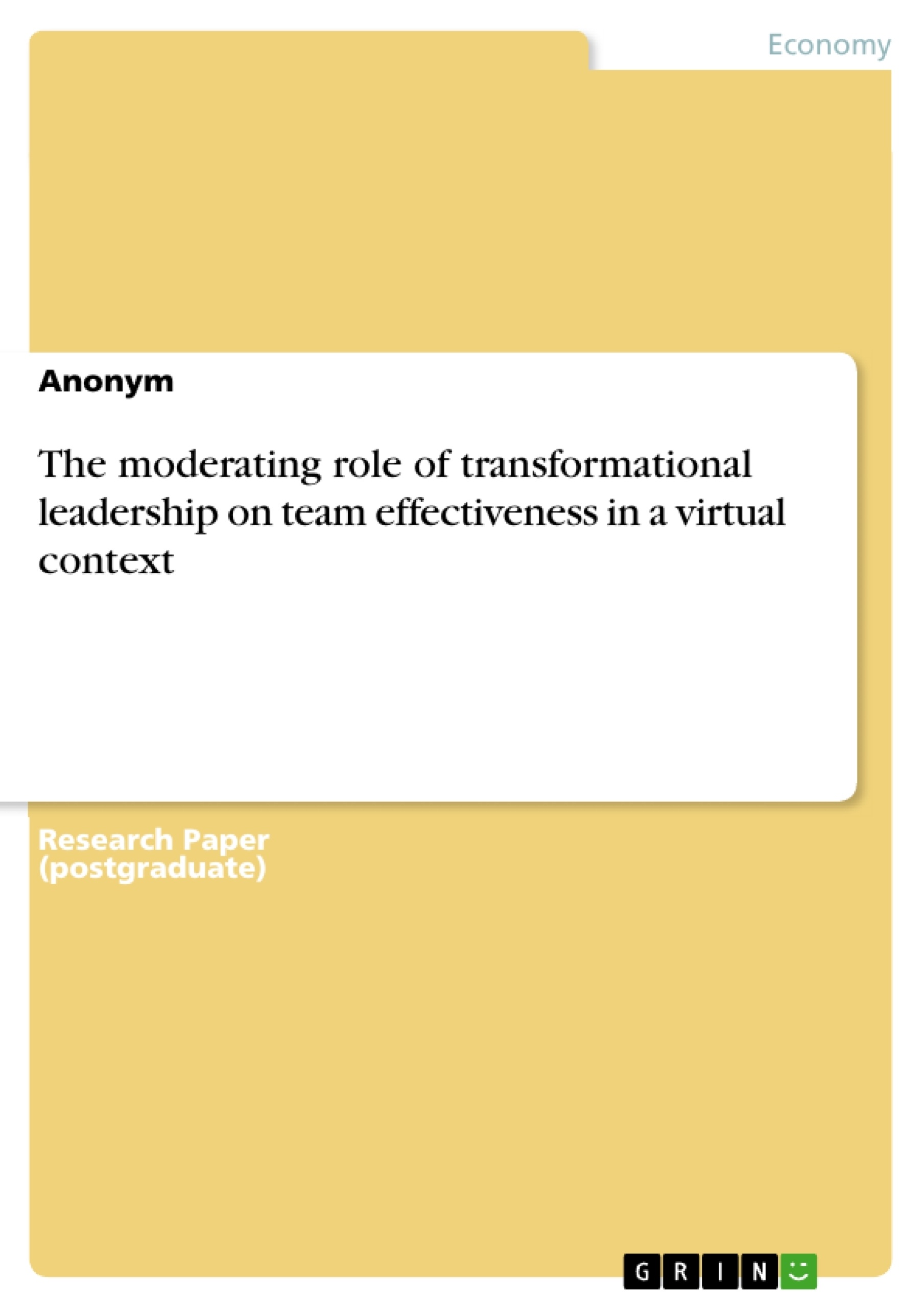Globalization, the resulting environmental changes, and the ongoing decentralization of the work process, as well as constantly evolving technologies and the current global pandemic, have significantly driven the formation of virtual teams (VT). Members of VT are geographically separated from each other and communicate via computer-mediated communication. The rapid implementation of digital technologies, especially virtual team collaboration technologies, leads to an increasing number and relevance of VT which is also evidenced by the fact that nowadays a large part of professionals already work or have worked in VT.
This seminar paper is based on the following research question: Could transformational leadership influence the relationship between virtuality and team effectiveness?
The objective of this paper is to give a brief overview of the existing research results on the individual variables, virtuality, team effectiveness, and transformational leadership style, as well as examining the main effect of the influence of virtuality on team performance and investigate the moderating variable in terms of whether transformational leadership can lead to improved team effectiveness in a virtual context.
Inhaltsverzeichnis (Table of Contents)
- Introduction
- Literature Review:
- State of the Art
- The impact of virtuality on team effectiveness
- Moderation
- Empirical evidence
- Virtuality and team effectiveness
- Moderation effect
- Discussion:
- Key findings
- Theoretical implications
- Practical implications
- Limitations and directions for future research
- Conclusion
Zielsetzung und Themenschwerpunkte (Objectives and Key Themes)
This seminar paper examines the complex relationship between virtuality and team effectiveness, particularly focusing on the moderating role of transformational leadership in virtual teams. It aims to clarify the inconsistent findings in existing literature about the influence of virtuality on team performance and explore how transformational leadership can mitigate potential challenges.
- The impact of virtuality on team effectiveness
- The moderating role of transformational leadership
- The challenges and opportunities associated with virtual teamwork
- The role of technology in virtual team collaboration
- The implications of virtual teamwork for organizational structure and leadership
Zusammenfassung der Kapitel (Chapter Summaries)
The introduction provides context for the study by outlining the increasing prevalence of virtual teams due to globalization, technological advancements, and the recent pandemic. It highlights the contradictory findings in the literature regarding the impact of virtuality on team effectiveness, setting the stage for the research problem.
The literature review delves into existing research on virtual teams, examining the state of the art in the field, exploring the various impacts of virtuality on team effectiveness, and discussing the concept of moderation in relation to team performance.
The chapter on empirical evidence presents findings from relevant studies, analyzing the relationship between virtuality and team effectiveness, as well as the moderating effect of transformational leadership. The chapter likely includes detailed analysis of specific studies and their methodologies.
Schlüsselwörter (Keywords)
The main keywords and focus topics of this research include virtual teams, team effectiveness, transformational leadership, virtuality, computer-mediated communication, team collaboration, technology, organizational structure, and leadership. The study likely examines empirical research findings related to these concepts.
Frequently Asked Questions
What is the focus of this paper regarding virtual teams?
The paper investigates whether transformational leadership can moderate the relationship between virtuality and team effectiveness, especially in the context of computer-mediated communication.
Why has the relevance of virtual teams increased recently?
Globalization, decentralization of work processes, technological evolution, and the global pandemic have significantly driven the formation of virtual teams.
What is transformational leadership in this context?
It is a leadership style that aims to inspire and motivate team members, potentially mitigating the challenges of geographic separation and digital collaboration.
How does virtuality impact team performance?
The paper explores inconsistent research findings on this topic, examining both the potential main effects of virtuality and how leadership can improve effectiveness.
What are the practical implications of this research?
The study provides insights for organizations on how to structure leadership to enhance performance and collaboration in increasingly digital and decentralized environments.
- Arbeit zitieren
- Anonym (Autor:in), 2021, The moderating role of transformational leadership on team effectiveness in a virtual context, München, GRIN Verlag, https://www.grin.com/document/1276419



